Socialist Equality Party presidential candidate Jerry White joined a team of supporters in downtown Detroit Tuesday to campaign for the upcoming public meeting, “The Crisis in Detroit and the 2012 elections” to be held Saturday near the campus of Wayne State University.
White and the campaign team visited schools, work locations and transit stops, distributing copies of an SEP newsletter, “No to bankers dictatorship in Detroit,” containing a statement by the socialist presidential candidate on the recent consent agreement between the city of Detroit and the administration of Republican Governor Rick Snyder. The agreement gives city officials the power to rip up union contracts and impose huge cuts in services.
White first visited the downtown Detroit campus of Wayne County Community College. Bekira Rollins, a student at WCCC, described the struggle she faced working and going to school. “For the working class, it is hard. The minimum wage is only $7-8 an hour. You have to pay for school. They have raised tuition. It is now $60 for one credit. If you are out of district, it is more.”
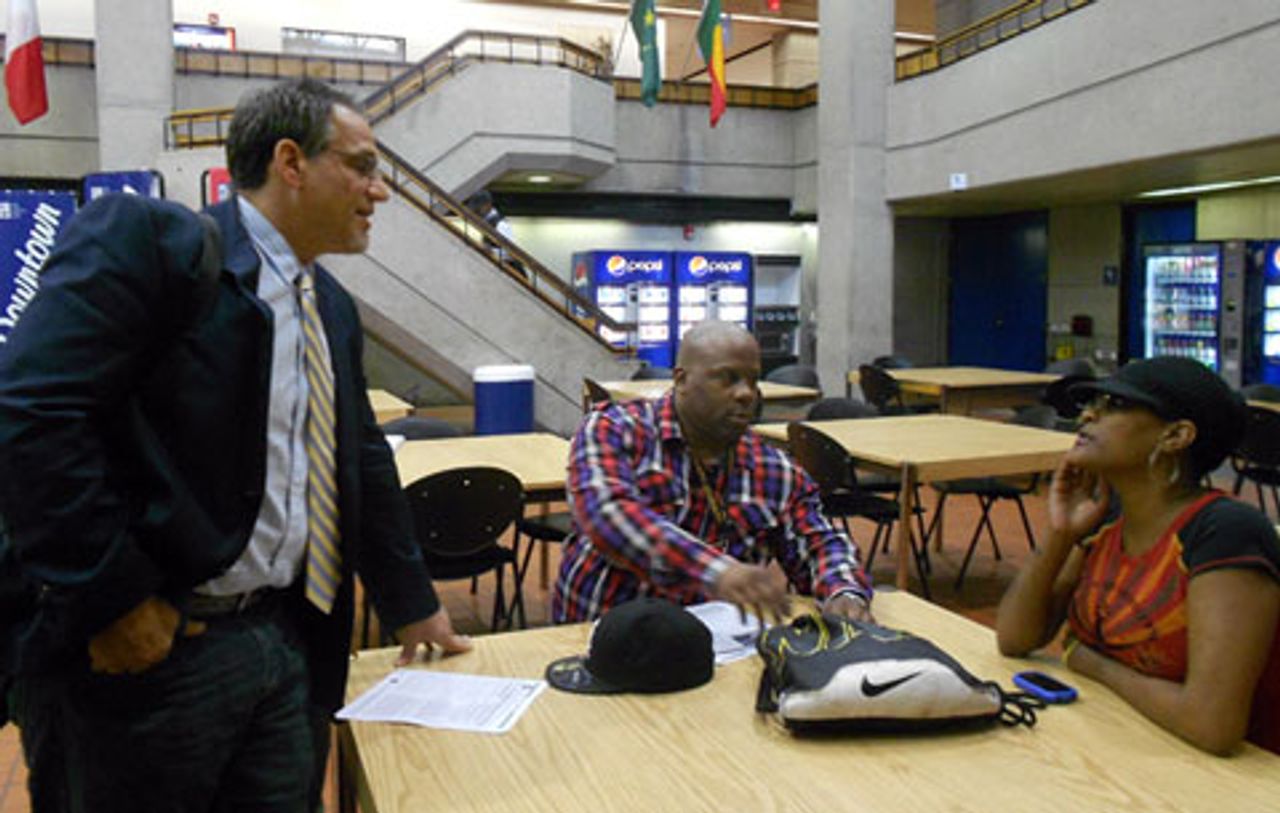 Bekira Rollins (right) with White and Zakee Mumhammad
Bekira Rollins (right) with White and Zakee Mumhammad Her friend, Zakee Mumhammad, said, “I am $11,000 in debt. I just applied for another loan because I am going to summer school. I need it for gas and living expenses.
“I am a caregiver,” Zakee added. “Last year I made $6,708. That’s why I am going to school. I plan to major in social work. I hope to go to Wayne State. They have a program to get a master’s degree in 10 months.”
“Detroit has been made an eyesore for the country. There are just 700,000 people now compared to 2 million at one time.” He suggested that many of the problems in the city were brought on by the residents themselves.
White explained that the working class was not responsible for the decline of Detroit. “What has happened to Detroit is the outcome of a deliberate policy by the banks and big business. Because our fathers and grandfathers fought for and won certain rights, from the 1970s on, big business set out to make an example of the working class in Detroit. They deindustrialized Detroit and the entire country. The wealth that the working class in this city created hasn’t gone back to the working class. It has gone to the wealthy, so a few people can live like kings.”
A team of SEP supporters spoke to workers in downtown Detroit during the noon lunch break.
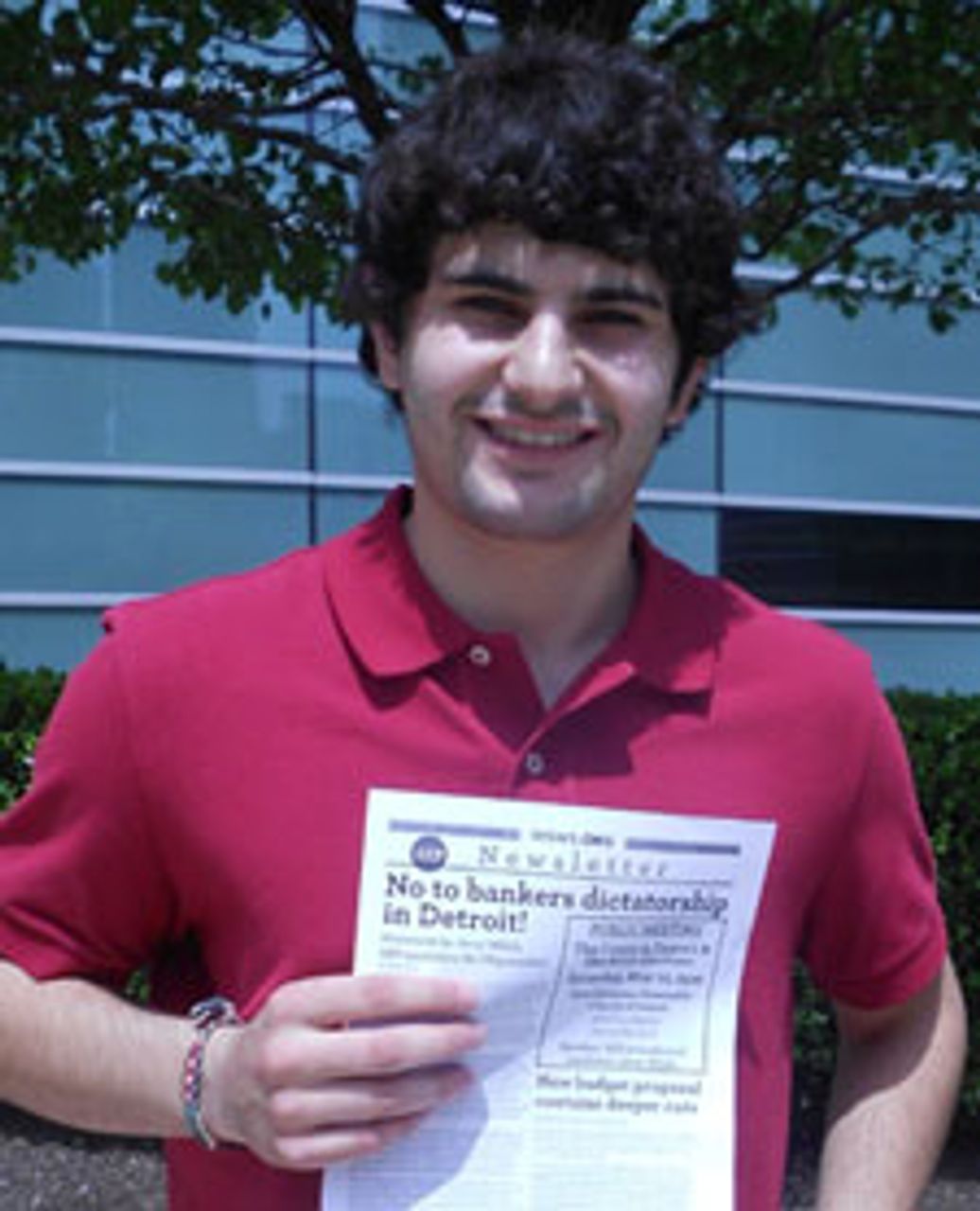 Shane Cann
Shane CannShane Cann, a young office worker, was excited to hear that a socialist was running for president. “I am definitely interested. I am glad that you are here. It is great.” Referring to the crisis in Detroit he said, “I grew up in the Wixom area. This is the first time I have worked downtown. What is happening doesn’t make any sense at all.”
SEP campaigners stressed that the attacks on the working class in Detroit were part of an international assault by the banks and big corporations. “We say the working class must organize internationally and reorganize society in the interests of the majority, not the wealthy,” one supporter said.
Shane added, “Almost any presidential candidate would do a bad job at this point in time. The whole system needs to change. I think you are on the right track.”
 Chuntai Davis
Chuntai DavisNineteen-year-old Chuntai Davis was eager to hear about the SEP’s program. A lifelong resident of Detroit, she supported the party’s call to defend the social rights of the working class, initiate a mass jobs program to rebuild infrastructure, and to redistribute the wealth to meet social needs.
“We need many more jobs, more health care, more schools. Right now, ordinary people bear the burden of high taxes, even on basic goods, and yet we don’t see any return on that in the form of services,” Chuntai said. “We need protection from crime and disasters. We need public transportation. Buses should be expanded, not cut. The buses need to run every hour, on the hour, to cut wait times.
“These departments should expand, and they need to rehire everybody they laid off.” Chuntai added, “This is the city of Detroit! We need a much bigger summer jobs program for young people.”
Chuntai explained that she had been looking for work, but that there was a great deal of competition for limited summer job openings, and it was hard to find help with care for her two-year-old. She also noted the difficulties in securing housing, saying that she wanted to move out but had to stay with her mother until she could afford to lay down a security deposit and rent. “The deposits alone are exorbitant,” she said. “It is hard to find work and save money when you have to pay for day care. There should be subsidized day care, but the place I looked at said even for subsidized childcare, there was a $150 deposit.
“The economy is so poor. Water bills, gas bills—everything keeps going up. You feel like you have to leave,” she said. “And the schools are in bad shape. We need to bring all the teachers back, and pay them as well as we pay principals. The teachers need a living wage. They need teachers’ aids. We have to have expanded lunch programs.”
Chuntai also lamented the lack of access to regular health care. “We need more health care. I had to go to the ER because I didn’t feel well at all. I didn’t know what was wrong—that’s why I went. But the doctor took a quick look at me and said, ‘you’re fine,’ and they just sent me home.” She said she was anxious to learn more about the SEP campaign and would make plans to attend Saturday’s meeting.
Jerry White next joined a campaign team at the Rosa Parks transit center. One transit user, Kapre Ranies, remarked in response to the boast of Obama that his administration had carried out the assassination of Al Qaeda leader Osama bin Ladin, “Killing Osama hasn’t changed anything, especially around here.”
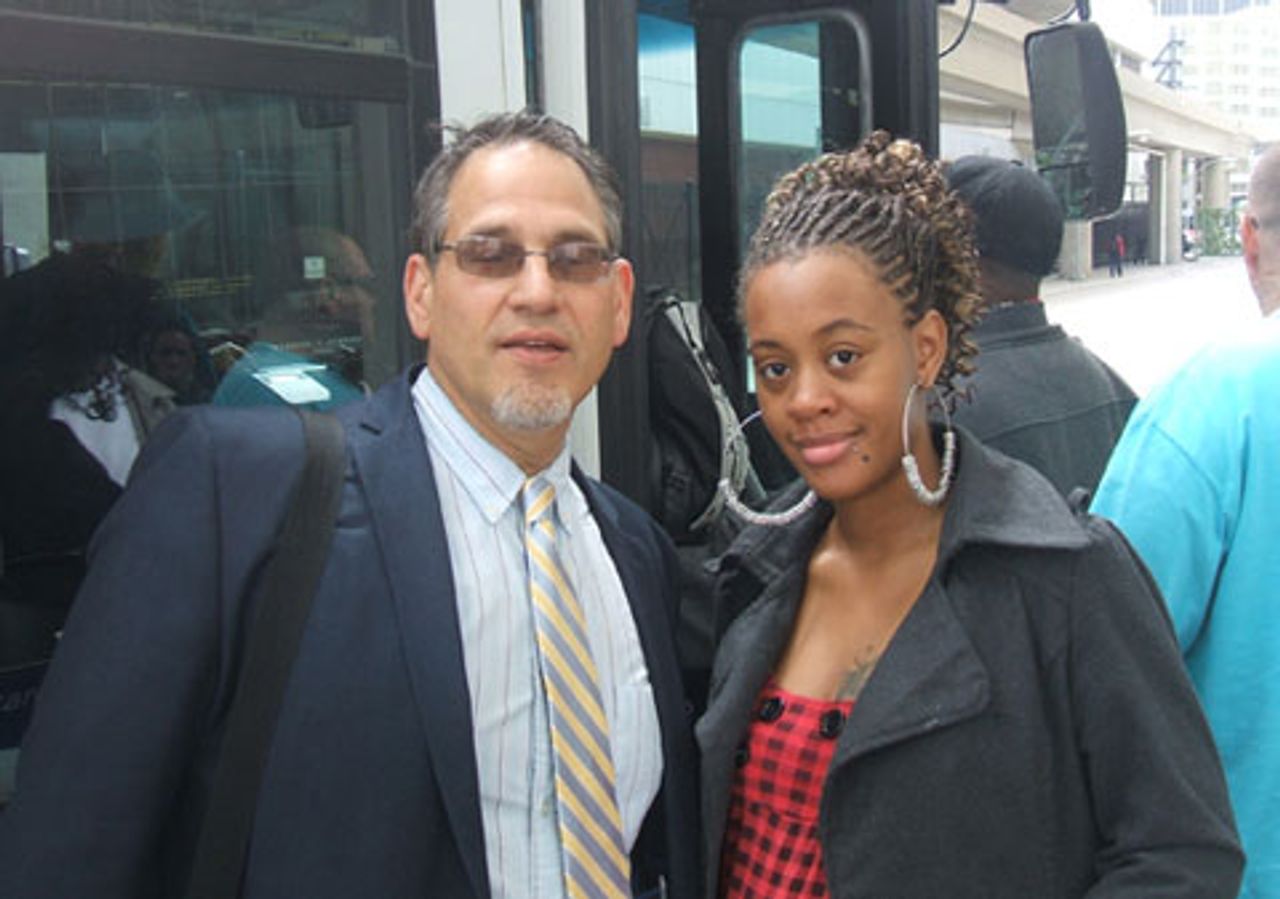 Kapre Ranies
Kapre RaniesKapre spoke about the recent cuts to bus service. “I have to catch the bus all the time, and it’s horrible. I don’t understand how they don’t have any money for things like this? Why is the city cutting off something so important? Everybody in the city uses the bus. And even still, you can’t even get to work on time, and there aren’t enough buses running as it is.”
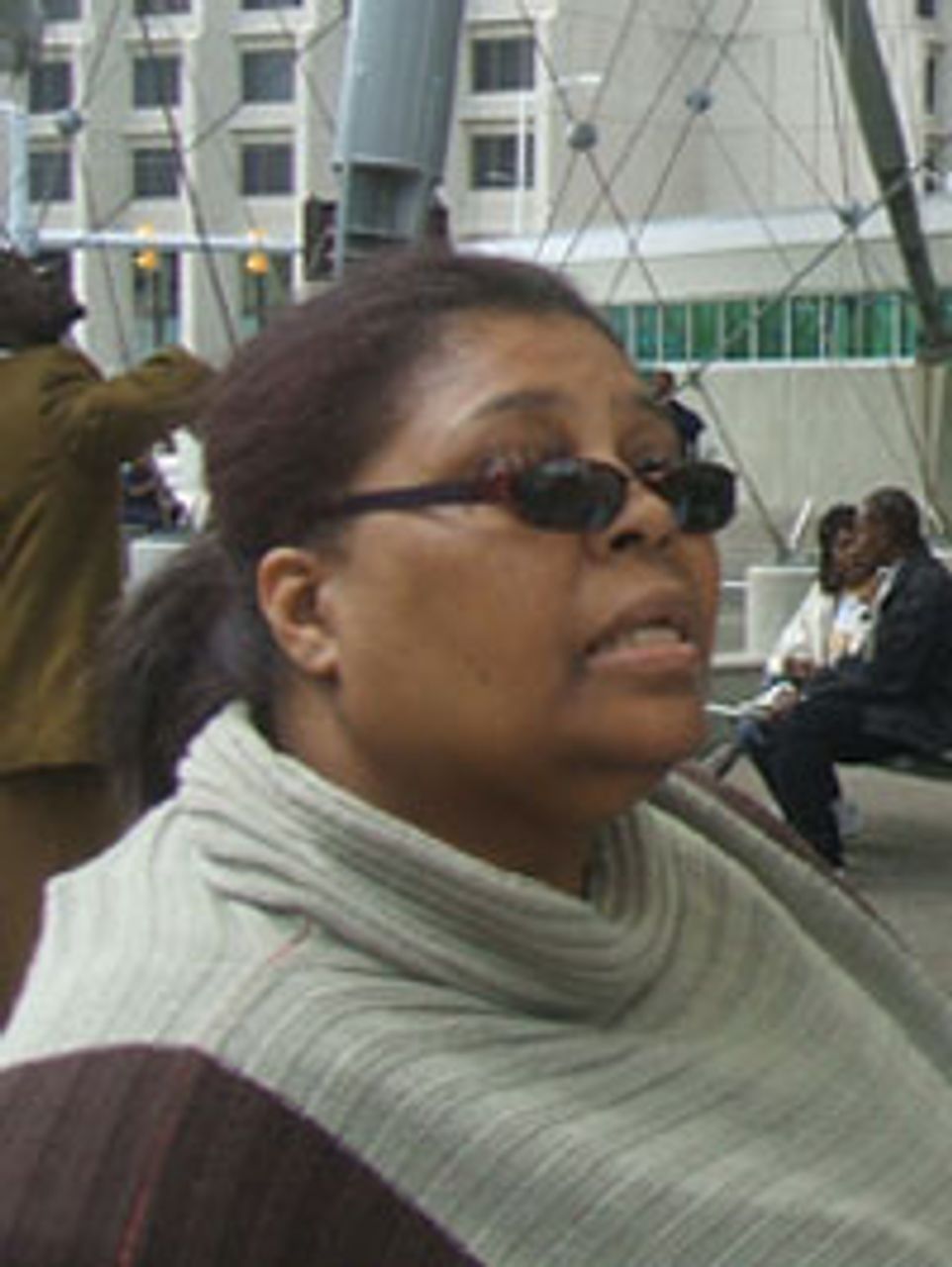 Valencia Tate
Valencia TateValencia Tate, a clerical administrator at a non-profit company, initially expressed resignation about the cuts to services in Detroit. “I don’t like it, but if it helps the economy and brings jobs back, then I guess we have to deal with it.”
White responded by pointing out that first Bush, now Obama, have made the claim that austerity measures would somehow help working people. White continued, “Not many jobs have been created and both of them bailed out the banks to the tune of trillions of dollars. Now, here in the US, as they’re doing all over the world, they’re gutting social programs and reducing wages.”
Valencia replied, “My hourly wages were reduced, basically overnight, from $13 to $8 an hour. And now I have to go back to school to try and get a third degree… I’m trying to help my kids, and my kids are trying to raise kids of their own, and it’s the same thing.”
In reply White said, “It’s important to remember that these aren’t individual problems; they’re collective. We live in a society of two classes, the working class and the rich. Millions of people voted for Obama to put an end to the misery and war. Far from ending the attacks on the working class, he has continued everything on behalf of the rich.”
Ronald Hill, a musician, said that he considered himself an independent. “From my understanding, socialism means sharing everything, and equality…and people like Paul Robeson, he was a socialist if I’m not mistaken.”
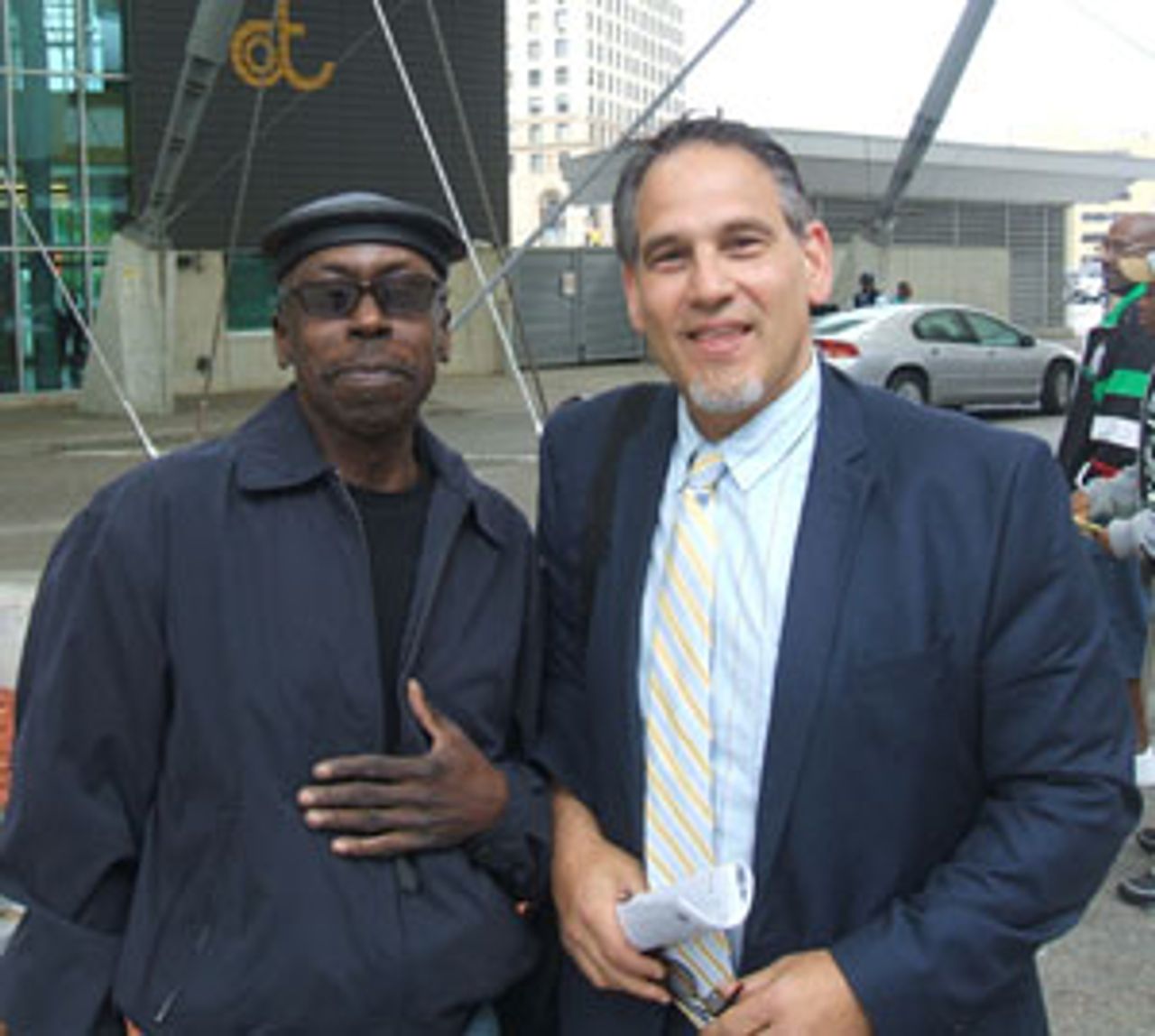 Ronald Hill with White
Ronald Hill with WhiteWhite noted that Robeson was in the Communist Party, which by the 1930s was dominated by Joseph Stalin, who put forth the notion that socialism could be built in one country. He explained that the SEP represents the legacy of Leon Trotsky, and internationalism.
Ronald then asked White, “Why be a socialist in a society that frowns on it today?” White explained that he became a socialist because he saw vast contradictions in society—between giant advances in science and technology and industrial production on the one hand, and yet, on the other hand, the continual attack on workers, and wars of destruction which threatened all of mankind.
“Capitalism is discrediting itself. Half the population is poor or near poor. There are wars of imperialism all over the world. Even if you compare now to the era of the early 1900s, it’s different. The capitalists then were rotten as well, but they produced things for the society they lived in. Today’s capitalists are out and out parasites and financial swindlers.”
For more information on the SEP campaign and to get involved, click here. Details of the Saturday meeting in Detroit can be found here.
